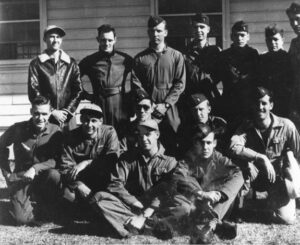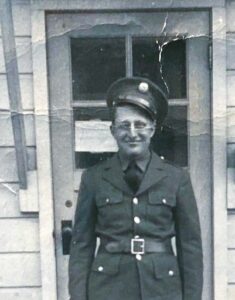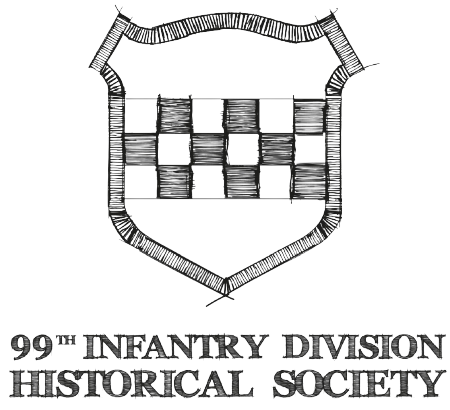Guerdon H. Nelson was in the field artillery ROTC at Harvard University when WW II started and subsequently went to basic training for 17 weeks at Ft. Bragg in North Carolina after enlisting. He then went on to officer training school at Ft Sill, Oklahoma and was commissioned as a 2nd lieutenant in the field artillery before leaving from Camp Kilmer, NJ aboard the Queen Mary 1 where he shared the bridal suite with 12 other men on their way to Europe. He crossed the English Channel from South Hampton England en route to Le Havre France in January 1945. He was twenty years old at the time. By the time he arrived in Elsenborn Ridge at the end of January, he was assigned as a forward observer in the 370th F.A. Battalion of the 393rd Infantry.

At 3 am on January 30th, the 99th went on the offensive and pushed north and east and by February 11th, the 393rd’s lines had extended across the Belgium/German border to Neuhof and Udenbreth Germany. Early on the morning of March 2nd, the 393rd started their advance, crossing the Erft Canal near the town of Glesh. They were finally on the banks of the Rhine River, opposite Dusseldorf and at 2:45 pm on March 13th, Guerdon and the 393rd crossed on a pontoon bridge just south of the Remagen Bridge, opposite Linz.
They crossed the Weid River on March 23rd on their way east to Giessen, which was the staging area for the Battle of the Ruhr Pocket. By April 17th, they were in Iserlohn and then in Landshut (immediately northeast of Munich) by the end of April where the 393rd liberated a P.O.W camp (see letter). Guerdon and the 370th were occupying a Luftwaffe airport in Schweinfurt when the war ended.
Through the many letters written home to his parents during the war and interviews over the years, Guerdon spoke both frequently about the positive aspects of his time in the service and less frequently about the horrors he observed. He was extremely proud to have served.
He spoke fondly of the hospitality a Belgium farmer and his family showed him, his love of flying in a Piper Cub, being an escort for Ingrid Bergman on a 3 hour drive after a USO show and returning to the US through NY Harbor and the Statue of Liberty when the war was over.
But he also was scarred by the memories of watching hundreds of engineers perish when the Remagen Bridge collapsed and the anguish of a field surgeon unable to save a man who had been shot during a German strafing run while in Linz.
==========================================================================
LETTERS HOME
3 April 1945 – Germany
Dear Mother and Dad,
The time has come where I can tell you what has been happening to me
lately. We came out of a … where the Battle of the Cologne plain started. We were a part of that and ended up on the Rhine opposite Dusseldorf when the Ninth Armored Division captured the Bridge at Remagen. The whole division moved south from the level of Düsseldorf to that of Remagen – a march of about seventy miles.
The 370th and myself crossed the Rhine on a pontoon bridge, which stretched across the river at Linz. It was quite a crossing since we were bombed and strafed as we crossed the bridge. In fact, a jerry plane dropped a bomb about 50 yards to the right rear of the vehicle I was in. It gave me great pleasure to watch that same plane being shot down a few seconds later. We stayed in position at Linz until we broke out of the bridgehead.
Love,
Guerdon
==========================================================================
24 April 1945 – Germany
Dearest Mother and Dad,
Today I got two boxes, one of candy and the other was that Christmas box, believe it or not. Both of them were excellent. Thanks so much for them. They meant so much, especially the photographs. Both arrived in good condition too. The Christmas package was wonderful, I thank each and every one of you with all my heart. You don’t know how much it meant.
You probably read that the 99th I.D. was in the Ruhr pocket clean up. We got a total of more than 300,000 prisoners alone out of the pocket. A pretty good haul! But not now we are far from there. When we finished up in the pocket we were at Iserlohn. All of the big cities that we have been through are just about completely leveled. Aachen, Duren, Cologne, Frankfurt to mention a few.
We have just heard news of the fall of Berlin. It shouldn’t belong before we make first contact with the Russians. Thanks again so much for the packages. They really were wonderful.
Love,
Guerdon
==========================================================================
May 15, 1945
Dear Mr. and Mrs. Nelson
I was recently a prisoner of war for twenty-nine months in Germany and was liberated by Lt. Nelson and his Third Army buddies and spent a day with him near Landshut, Germany as the unit was moving on down into Bavaria. He is in excellent health, sends you all his love and expects to return to the U.S. before too much longer. They made approximately 100,000 prisoners very happy in our camp area when they came through.
I asked the privilege of writing his parents of his whereabouts on returning to the U.S. Very kindest personal regards. Thanks from the P.O.W.’s
Capt. L.C. Kennedy
==========================================================================
25 May 1945 – Germany
Dearest Mother and Dad,
We are now allowed to say exactly where we are located when we are there. Right now we are staying at a Luftwaffe airport about a mile outside of Schweinfurt. Schweinfurt is the place where they had those big ball bearing factories which were bombed so much. The town itself is really a mess. There is hardly a building left standing intact. The place we are staying is very beautiful.
The damage to it is negligible. There are two very fine dining halls – one for the EM and one for the officers. We have swell rooms – one of the … plane pilots and myself share a two room suite. He also comes from New Jersey.
We were at Giesenhausen about twenty miles south of Landshut when the war ended. Our front line elements were lined up along the Isar River, which marks the Austrian border, and we were ready to go across the river and head to Salzburg when all the Germans between us and the Fifth Army surrendered.
In case I forgot to tell you, we went from the U.S. First Army to the U.S. Third Army after we left the Ruhr Pocket. Also, you might be interested in knowing that the 69th Infantry division, the division which first made contact with the Russians, relieved us in the woods in front of [Munningen] Belgium (we were there on our way through the Siegfried Line) at the beginning of last February, that was the first time that they went onto the line.
Well, I now have two battle stars according to “Stars and Stripes”. It is 8:30 now so I have to go to work.
Love,
Guerdon
==========================================================================




